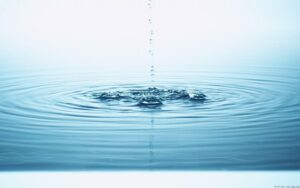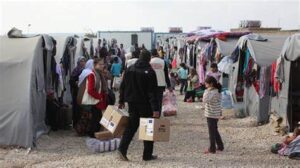Taking a Key Resource For Granted
I used 3.4 cubic meters of water a day (900 gallons), 6300 gallons a week, and 327,600 gallons a year according to the Water Calculator (Grace Communications Foundation). According to the Water Footprint Network, I used 1,673 gallons of water a day, 11,711 gallons per week, and 608,972 gallons a year (Hoekstra, Van Heek). This was less than the United States average use of water which is 1,802 gallons per day (Grace Communications Foundation).
Iraq had no data available on water use, however, Turkey used an average of 1189 gallons per person according to the Water Calculator while Iran used an average of 1347 gallons of water per person (Hoekstra, Van Heek). In the United States, 80 percent of the water is consumed internally. In Iran, 82 percent of the water is consumed internally. In Turkey, 79 percent of the water is consumed internally. (Hoekstra, Van Heek)
Turkey and Iran compared to the rest of the region consume more water (Hoekstra, Van Heek). Their consumption is still much lower than in the United States. One reason I think the United States’ consumption of water is so high is due to the consumption and competition-driven society of the United States. This motivates the people of the United States to use resources much less conservatively than countries like Iran and Turkey. The mass production, agriculture, and innovation that occurs in the United States also require large amounts of water.

One thing I noticed is most of my water consumption comes from recreation. This came due to my driving to baseball, showering after the gym, and showering after baseball. In the United States, there is a great emphasis on sports and recreation for children and young adults. This creates large amounts of water consumption as water is needed to hydrate us, fuel our performance, and clean us. Furthermore transportation drives water consumption in the United States. Most parts of the United States are not walking-oriented and many United States citizens own personal vehicles. This social norm in the United States to use cars, further motivates large water consumption.
In my area of concentration, water scarcity can drive human rights concerns. This is especially evident in Turkey. Turkey has a large population of Syrian refugees. This influx of new migrants leads to large concentrations of people in refugee camps. The proximity of people combined with a large increase in population due to migrants seeking refuge requires greater access to water. As a result of this lack of access, people often use unclean water and lack the water resources needed to sustain life. This in turn leads to the spread of disease (Abbara, Coutts, Fouad, Ismail, Orcutt, Rayes, Roborgh, 4).

Human rights concerns and lack of access to water can also contribute to political and social unrest. As previously discussed, lack of access to water can lead to humanitarian concerns. Lack of water access promotes frustration among the common people because their needs are not met. In an already unstable region with a wide variety of ethnic groups, this rising dissent can lead to shifts in the political makeup of the region due to public outrage and even revolution. Furthermore, these shifts lead to instability and conflict. This instability and conflict does not only affect the politics of one country. Conflict can spread over borders and shift the relationships between multiple countries.
Lastly, water drives economic success and innovation. Water is needed for production and transportation to both create and distribute products and services. This is evident in the United States and has allowed for the great economic growth of the United States. Water is needed to promote the economic growth and stability of many countries in the region. Furthermore, in countries like Iraq which need to grow their markets to gain stability and prosperity a lack of water access poses great barriers.
Image Links
https://th.bing.com/th/id/R.24db79c59bbfb792a093a35cd5276d1a?rik=YAYN1zArS4c52w&riu=http%3a%2f%2fwallpapercave.com%2fwp%2fY2pnb5U.jpg&ehk=U9%2b5Rr5dCUSUx2OkzDO7o8yy8gGnz%2b%2be%2f5rxK6gsXYQ%3d&risl=&pid=ImgRaw&r=0
https://th.bing.com/th/id/OIP.m7Ecgu6uxzwNK1781Y483AAAAA?rs=1&pid=ImgDetMain
References
Abbara, Aula, Adam P Coutts, Fouad M Fouad, Sharif A Ismail, Miriam Orcutt, Diana Rayes, Sophie Roborgh. “Informal Health Work in Fragile and Conflict-Affected Settings.” Refugees, Healthcare and Crises: Informal Syrian Health Workers in Lebanon. International Institute for Environment and Development, 2018. http://www.jstor.org/stable/resrep16510.7.
Grace Communications Foundation. “What’s Your Water Footprint” Water Footprint Calculator. Water Calculator, 2017. What’s Your Water Footprint: Water Footprint Calculator Home Page (watercalculator.org)
Hoekstra, Arjen and Michiel van Heek. “National Water Footprint Explorer. Water Footprint Network, 2020. National water footprint explorer – Water Footprint Network
Hoekstra, Arjen and Michiel van Heek. “Personal Water Footprint Explorer. Water Footprint Network, 2020. Personal water footprint calculator – Water Footprint Network.
blackmac Said,
April 1, 2024 @ 1:50 am
Hi Evan! I really enjoyed reading your comparison between the water consumption in Turkey and Iran and the water consumption in the United States. In your discussion of the United States, I think you made an excellent point that our water consumption as a nation is so high due to our mass-production and economy. As we have learned in class, even the production of goods requires a significant amount of water. I know this might not be particularly relevant to our class, but if production requires significant water, I would be curious to see what China’s water consumption rate is per day.
Additionally, I found it interesting how Iraq does not report what their daily water consumption is. Do you think it is a problem that Iraq does not report this data? Does this impact the monitoring of SDGs, particularly SDG 6 (clean water and sanitation) in Iraq, why or why not?
connerye Said,
April 1, 2024 @ 1:40 pm
I do think it is a problem. Like you said it is tough to monitor progress towards these goals without statistics. This would impact both goal six and goal nine. Without these figures, countries could potentially believe that Iraq, due to the presence of the United States has access to water. Countries may be less willing to provide aid as a result. This leads to less partnership between institutions to promote the access to clean water and sanitation within Iraq.
Annie Elliott Said,
April 2, 2024 @ 3:27 am
This is a great post! I think it’s great you point out transportation in your analysis. I think that there is a huge deficit in accessible public transportation in the US. In order to maintain your well-being you almost have to have a car, which is a huge drain on water.
Do you think that water can drive conflict in the same way that food security in the region can? Why do you think it is important to note who is in power when analyzing water management?
connerye Said,
April 2, 2024 @ 2:30 pm
Water can drive conflict. I think most of the conflict over water would be between states and their populations rather than between states. This conflict will come from these populations becoming angry with leadership over their inability to provide basic resources like water. I think looking at who is in power is a key consideration. Autocrats will likely focus on ensuring their populations are not able to unite and undermine regime security. Autocratic regimes will be more focused on promoting ideology and stability rather than human security. In contrast, democracies will be forced to listen to populations. This will create more of an emphasis on addressing human security issues like water access.
Darren Moses Said,
April 7, 2024 @ 11:50 pm
This is a awesome and very interesting post. I liked that you brought up the transportation in this blog post. I think in order to maintain your well-being you almost have to have a car, which is a huge drain on water, according to the websites we used to create our blog post. My question to you is, why do you find it important to bring up who’s in power when it comes up to water management or why did you bring it up? Also why do think that Iraq has no date, do you think they withhold this information, and if so why?
connerye Said,
April 8, 2024 @ 1:07 am
I think it is important to bring up who is in power because one of the main focuses of the class is the politics of the Middle East. Politics plays a key role in water access. For example, democracies allow for leaders to be answerable to the people. As a result, leaders will ensure populations have water access. In contrast, authoritarian regimes are less accountable and may have other priorities besides providing for their subjects. I think Iraq does not have data on water access due to the lack of reliable institutions. This comes as a result of the United States’ 2003 invasion.